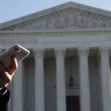At issue in the case of Carpenter v. United States is the government’s warrantless collection of cellphone records to use as evidence of an individual’s location and movements in a criminal prosecution. The individual in this case, Timothy Carpenter, was sentenced to 116 years in prison for a string of armed robberies. Records of the defendant’s cellphone usage were introduced against him in court, connecting his location with the vicinity of the robberies in question.
The petitioner’s application for a writ of certiorari was filed on September 26th, 2016, and a month later amicus briefs were filed by the Electronic Frontier Foundation and the Cato Institute. The petitioner’s brief was filed in August 2017, and the respondent’s brief was filed in September, amid 15 other amicus briefs in support of either petitioner or respondent. Clearly this case may have wide-ranging impacts over privacy rights and criminal investigations using a wide variety of ever-evolving and rapidly changing technology. Oral argument was held by the court on November 29th, and a decision should be forthcoming soon. You can listen to audio of the hearing or view a written transcript at www.SupremeCourt.gov.
Lower courts in the case sided with the government, but the supreme court justices seemed more sympathetic toward the petitioner’s case in their oral argument questioning. For instance, the government argued that cellphone records should not be protected because they are created by phone providers and given to the government, rather than obtained or collected by the government itself. Justice Roberts, however, viewed such records as being co-created by the provider and the owner of the phone. He also pointed out the Supreme Court’s precedent in Riley v. California, which upheld a requirement for a warrant in order to search a person’s cellphone.
Additionally, Justice Kagan drew an analogy between this case and United States v. Jones, which held that the police attaching a GPS to a car to track its location amounted to a search under the Fourth Amendment. The government retorted that Jones involved direct surveillance conducted by the government, as opposed to obtaining business records created by a third party.
This case involves the application of the Stored Communications Act, which protects certain records from disclosure absent a court order or warrant. The government had argued that the Stored Communication Act did not apply to this case. Another central focus of the case seems to be the application of the third party doctrine, which states that Fourth Amendment protections do not extend to personal information that has been shared with another party. The third-party doctrine has its limits, however, and many federal laws protect certain kinds of private information even if it has been disclosed or shared with another party.






